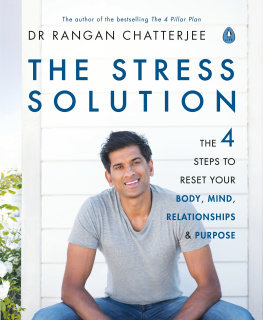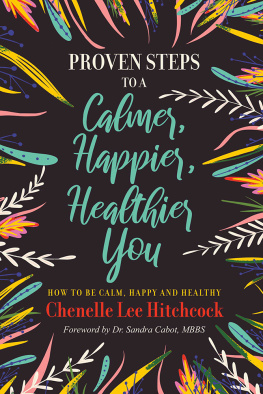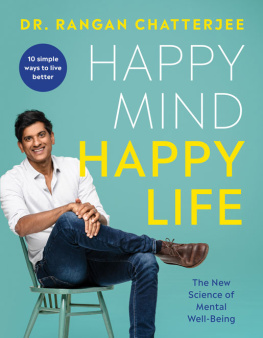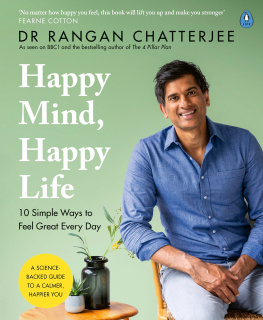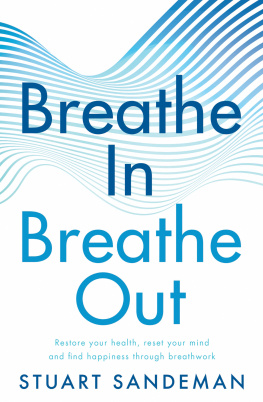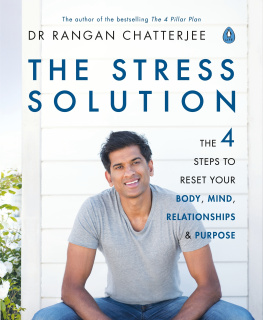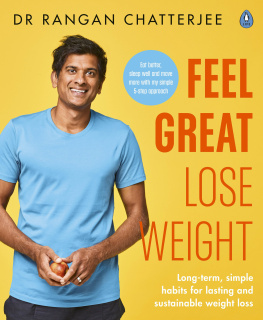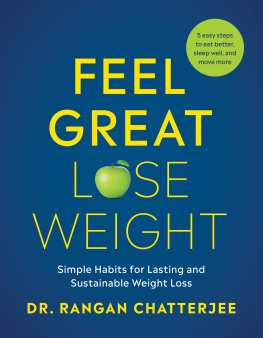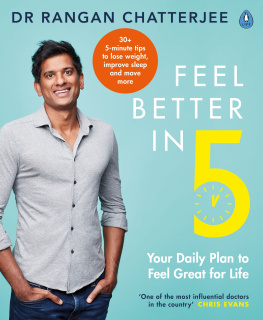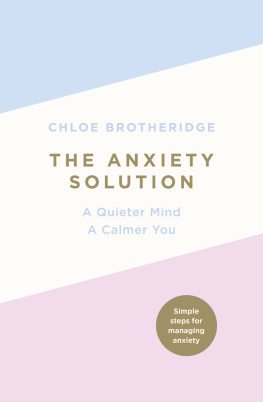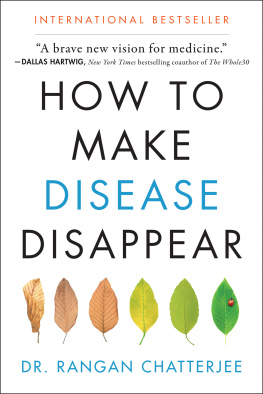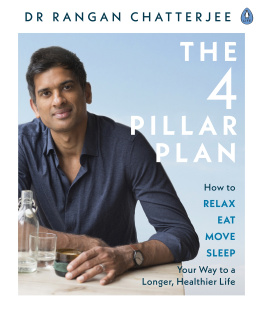

DR RANGAN CHATTERJEE
THE STRESS SOLUTION
THE STEPS TO RESET YOUR
BODY , MIND , RELATIONSHIPS & PURPOSE
PHOTOGRAPHY BY SUSAN BELL

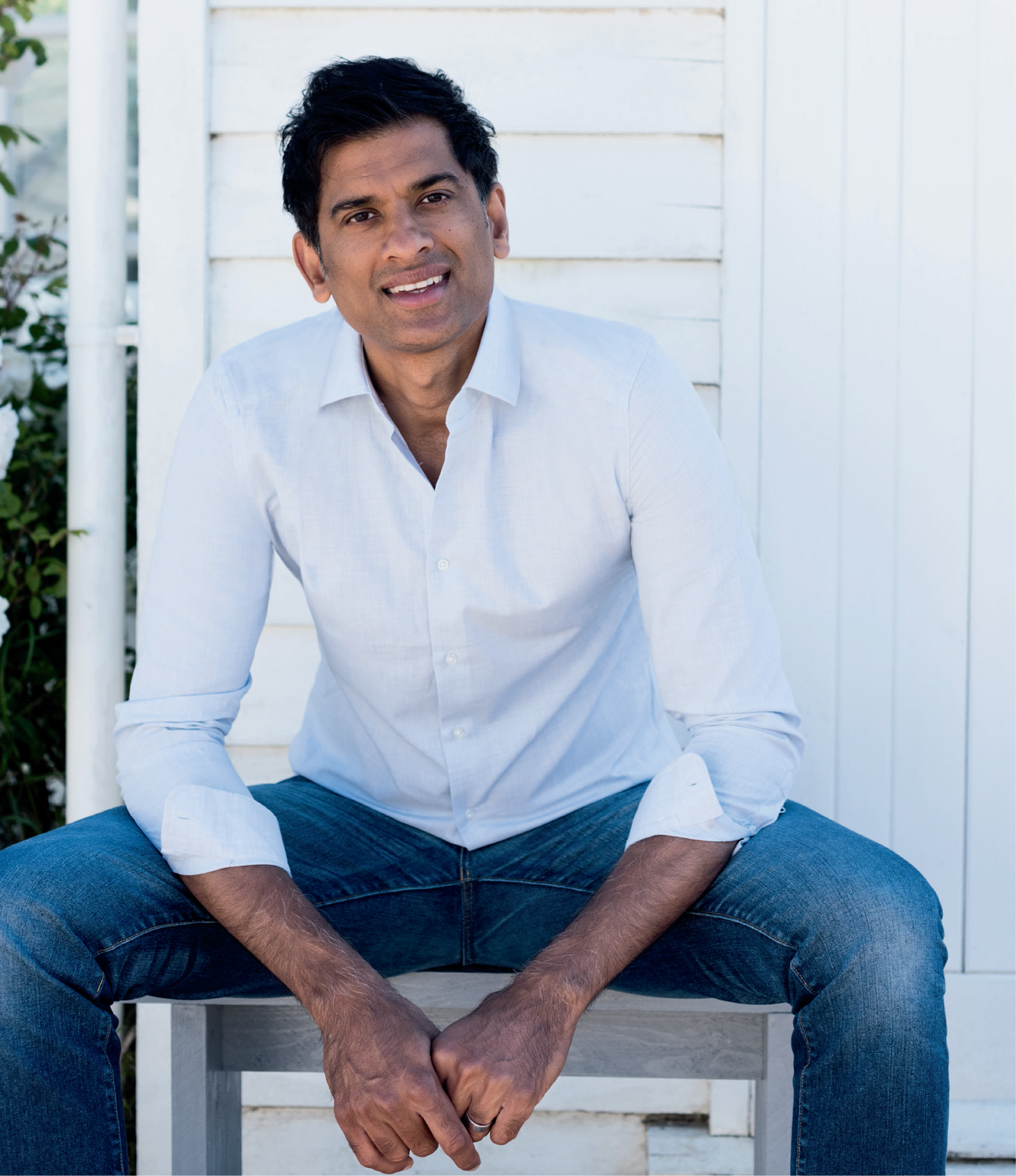
CONTENTS
ABOUT THE AUTHOR
Dr Rangan Chatterjee is a pioneer in the emerging field of progressive medicine, a leading voice in the lifestyle medicine movement and is changing the way that we look at illness. He is known for finding the root cause of peoples problems by taking a broad approach to health, which was highlighted in his groundbreaking BBC TV show, Doctor in the House, and in his internationally bestselling first book, The 4 Pillar Plan. He is the resident doctor on BBC Breakfast, a regular commentator on BBC Radio and hosts his own chart-topping podcast, Feel Better, Live More. He writes for the Huffington Post and has a monthly column on lifestyle medicine in Top Sant. He regularly lectures on his subject at events around the world.
drchatterjee.com
Facebook: DrChatterjee
Instagram: @DrChatterjee
Twitter: @drchatterjeeuk
Podcast: Feel Better, Live More
For Vidhaata, thanks for
taking this journey with me.

INTRODUCTION
Let me introduce you to the Cupboard of No Return. It lives on my kitchen wall. Open the door and youll see three deep shelves, each crammed top to bottom with the shrapnel of everyday family life. Looking at it right now, I can see a golf ball, two hammers, stacks of unopened envelopes, a passport, an academic paper about mitochondria that should have gone into my previous book but didnt because it was stuffed in here, a broken screwdriver, two taxi receipts, a lightbulb that may or may not be functional, plastic pieces from a board game, a childs glove and an electric toothbrush charger. The chaos in that cupboard is the cumulative result of dozens of isolated stressful moments in the daily life of me and my young family from when my daughter lost her glove, to when a picture fell down and I was too busy to put the hammer back in the shed, to when I was running late for work and didnt have time to put the mitochondria paper in its appropriate folder.
Heres why the Cupboard of No Return is such a problem. It isnt just the result of stress, it also has the power to generate stress. Pretty much everything in there has the potential to sprout fresh moments of anxiety and frustration when we want to play a board game and cant find the pieces; when were rushing to get out and my daughter has only one glove; when the electric toothbrush has run out of charge and we cant find the charger; when were rushing for the airport and were down one passport. Even looking at the cupboard is the cause of stress. I can feel it glowering at us as we eat at the kitchen counter, its presence a constant reminder of all the things we havent done. Even though I may not always feel conscious of it, its broadcasting information to my brain. Its suggesting, in a surprisingly powerful way, that my life is out of control and that there are problems in my environment that Im just not on top of.
This is just how the stresses in our everyday lives work. The very existence of stress in our lives, minds and bodies has the power to generate more stress. The more that piles up, the less were able to cope and the nearer we move to that threshold at which we simply stop managing our lives successfully. Thats when we become overly reactive, emotional, weary and, eventually, sick. People who are stressed are more likely to fall out with others, binge on bad food and alcohol and fill up cupboards with problems that will inevitably tumble out on top of them at the worst possible moment.
THE CONSEQUENCES OF STRESS
Stress can have devastating long-term consequences for health. Too much of it contributes to the development of obesity, type 2 diabetes, high blood pressure, cardiovascular disease, strokes and Alzheimers disease. Stress is also a key player in insomnia, burn-out and auto-immune disease, as well as many mental health disorders such as anxiety and depression.
Despite these risks, many of us are blas about stress. We think we can get away with burning the candle at both ends for ever. The reality is very different. Every day I see patients who are literally stressing themselves to an early grave. I know a local accountant who is go-go-go the entire time. He never switches off, and his wife is worried. But because he has no serious symptoms at the moment, he wont listen to either of us. He assumes nothings going wrong and that the stress isnt harming him. But its probably damaging his body so much that, within a few years, I suspect hell be hit with a serious health crisis.
Make no mistake, we are living in the middle of a stress epidemic. In fact, the World Health Organization calls stress the health epidemic of the twenty-first century. Up to 80 per cent of all GP consultations are thought to be somehow related to stress. In this book Im going to give you a series of practical solutions to help you de-stress your life. Most of them are simple and some take less than fifteen minutes a day. Ive seen these tools change the lives of thousands of my patients. I know theyll do the same for you.
MICRO STRESS DOSES (MSDs)
Well never completely rid ourselves of stress. Its unavoidable, especially in this day and age.
Were living in an era of information overload and work overload and sugar, alcohol and sitting-on-our-backsides-all-day overload. There seems to be more and more pressure on us as individuals and less and less support. Think about something as simple as booking a holiday. Twenty years ago a travel agent would have arranged it on our behalf and spared us all the hassle. Today, many of us choose to do it all ourselves, and this is the way so many things are going. Were bleeping our own shopping through at the supermarket, having to work out how to fix our own computers by digging around on baffling online forums and poring through endless FAQ lists. Particularly with the recent tech explosion, we have more jobs to do, which is creating more stress in our lives. I call such individual portions of stress Micro Stress Doses, or MSDs. Whether they come from the tech in your life or theyre just the standard stresses that come with being a husband, a wife, a parent, a boss or an employee, theres not a day that goes by without you experiencing plenty of them.
Take a typical hour in the life of Alexandra, a working mum. Shes had a late night and her smartphone wakes her up at 6.45 a.m. (MSD1). She flips it on and checks her Facebook feed, where she sees that a work colleague is watching the dawn on a stunning Greek island (MSD2). She flicks to a news site and sees some horrible photos taken in the wake of a mains gas explosion (MSD3) and a headline about a hate crime thousands of miles away in Canada (MSD4). She gets a text message from her phone provider telling her that her bill is ready to view (MSD5). Her husband tuts at the pinging of her phone (MSD6). She realizes she has a heavy stomach (MSD7) and a blurry head (MSD8) after lasts night treat of a pizza and an extra-large glass of wine which she had allowed herself after her stress-filled day. She notices there are paw prints on the duvet as Muffles has been sleeping on the bed again (MSD9). She goes to rouse her son, who yells at her (MSD10). Feeling groggy and irritable, she yells back (MSD11). She goes to the kitchen, sees through the window that its raining (MSD12), registers how dirty the windows are (MSD13), remembers she has to track down a plumber to check out the weird dripping noise thats coming from the hot-water tank (MSD14), has another quick look at her phone (MSD15, 16, 17, 18) as the kettle boils, sees the chocolate biscuits that are left over from last night and thinks, Sod it, Im eating one (MSD19). She realizes her son has still not got out of bed (MSD20) and, now feeling really frustrated, barks up at him to get
Next page
